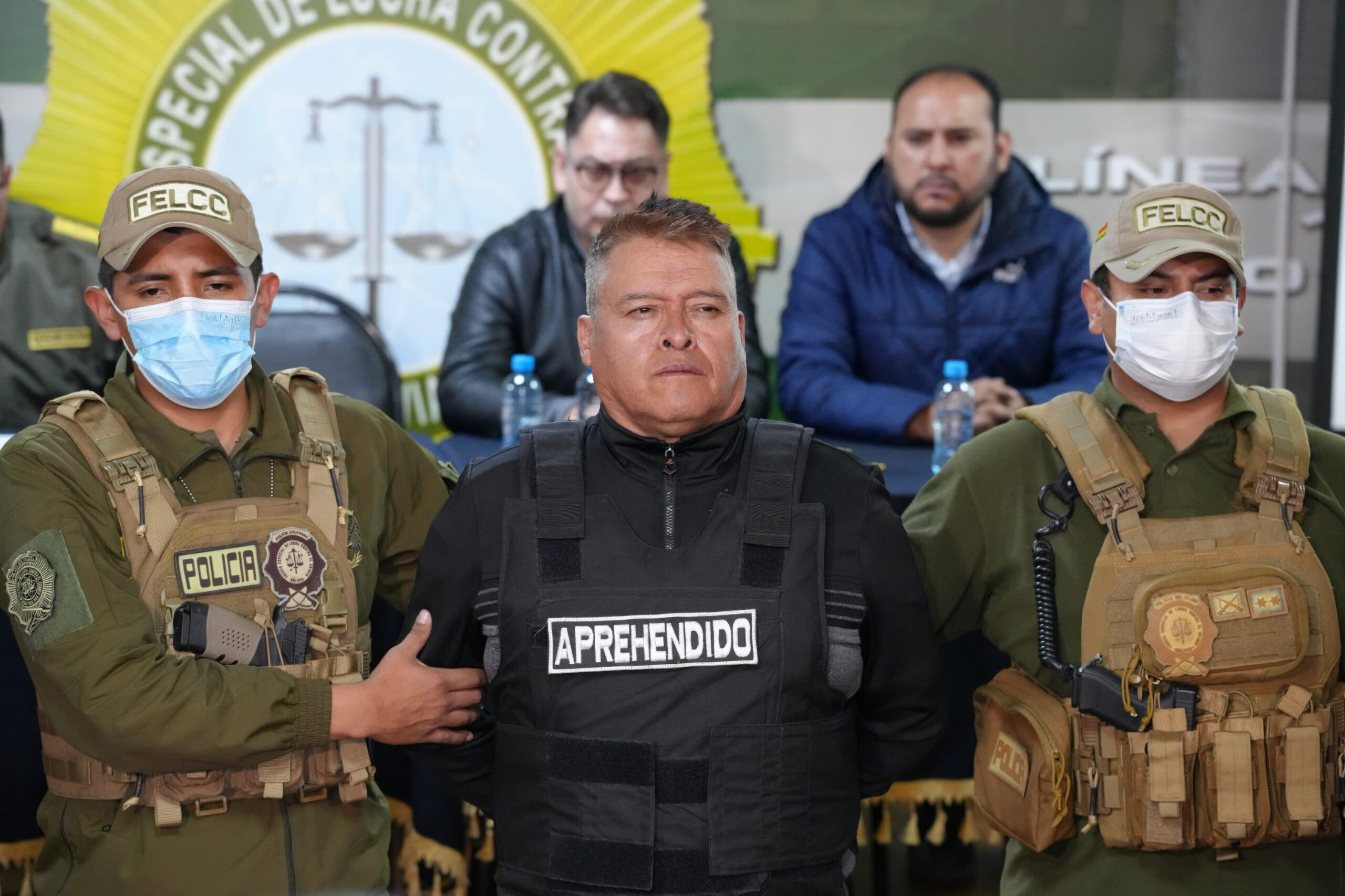Bolivia’s army chief, Juan José Zúñiga, was arrested in the nation’s capital after military units under his command attempted to occupy the presidential palace in La Paz on June 26.
Armored vehicles forcefully breached the palace entrance, leading to a direct confrontation between President Luis Arce and Zúñiga. Arce demanded Zúñiga’s withdrawal, which was followed by the mutinied military units’ retreat. The rebellion lasted just three hours.
The dramatic events unfolded a day after Arce fired Zúñiga following comments he made on national politics in a television interview. Zúñiga stated that former President Evo Morales could not run for president again in the October 2025 elections and implied that the military would prevent him from taking power if necessary.
While attempting the coup, Zúñiga called for the formation of a new Cabinet and said he recognized Arce as president “for now.” Meanwhile, supporters of Arce and the ruling Movement Toward Socialism (MAS) party poured into the streets to protest Zúñiga’s actions. The attorney general has opened an investigation. The events took place amid acute political and economic instability that has dogged Arce’s administration for months.
AQ asked observers to share their analysis:

Raúl Peñaranda U.
Director of the Brújula Digital news portal in Bolivia. In 2015 he won the Maria Moors Cabot Award, awarded by Columbia University.
Bolivia’s June 26th events are as confusing as contradictory, adding to the singularities of Luis Arce’s presidency. In a Monday interview, General Zúñiga made comments supporting the head of state and criticized former President Evo Morales, even threatening to “arrest” him, as if that were within his powers. But two days later, he tried to carry out an alleged coup against Arce and even talked about freeing political prisoners, contradicting his statements of 48 hours before.
Several perplexing questions linger: Was the attempted coup a “staged” act by the ruling party to garner support? Why employ a commander loyal to the president instead of a more politically neutral officer? And why didn’t the president order Zúñiga’s arrest after he drove a small tank and forcibly entered the Quemado Palace? Why let him go to arrest him hours later? The sequence of events remains a puzzle.
Another plausible scenario is that Zúñiga’s actions were not a farce. He might have made his statements on Monday with the president’s approval, only to exceed the expected level of outrage. Faced with no other choice, the government had to dismiss him. Zúñiga, feeling “betrayed” by Arce, then orchestrated the sui generis military coup.
Wednesday’s events reflect Bolivia’s current times: a weak government that does not solve the problems, a president who is self-absorbed, incapable of giving certainty to the citizens, ruling with a minority in the legislature.
Meanwhile, for Zúñiga, years of judicial difficulties await, starting with a deprivation of liberty that at this time seems indefinite. The potential consequences of his actions may bring a sense of justice and closure to this tumultuous chapter in Bolivia’s history.

Lorgio Orellana Allión
Sociologist and researcher at the University of San Simón in Cochabamba specializing in social and political conflict.
The military skirmish of June 26 was not staged theater, as suggested by dozens of analysts, legislators, opposition leaders (including from the “evista” wing of the MAS), and Zúñiga himself after his arrest. What general would be willing to be mistreated in public, supposedly to repair the weakened legitimacy of the Arce government? Without factual support, the “staged” hypothesis lacks logic; it falls apart and is absurd.
The rebellion indicates that pro-coup tendencies are very present in the Bolivian army. The disparagement of the military by the government and the legislature has made the armed forces increasingly intrepid and willing to act. Their intervention in November 2019 when they called for the resignation of President Evo Morales, and now Zúñiga’s statements in his infamous interview on Monday—stating that the army would use its armed wing to prevent Morales from being a presidential candidate—show that they are deliberating and intervening in politics.
To all this we now add the new coup attempt of June 26, when Zúñiga tried to take over the government and announced he would change the Cabinet. The events outline a trend; they are not isolated. As Bolivia’s social crisis worsens, it seems that in the near future, we will once again see the military intervening in the country’s politics.

Gustavo Pedraza
Political analyst and former vice-presidential candidate with the center-left Comunidad Ciudadana coalition party.
Two contrasting hypotheses are being debated to make sense of the events in La Paz on June 26. One suggests that the government orchestrated the rebellion to improve its public image after quelling a coup staged by a disgruntled army general. The other argues that this was a genuine coup attempt.
The first version is being used by the opposition and a large part of the public, while the second iteration is being used by the government and its supporters as it searches to regain the lost public trust. Regardless of their goals, both theories have one single cause: the context of political instability, economic crisis, and deep public mistrust toward the government. Arce’s administration has been cornered by public distrust, as well as political and economic miscalculations and pitfalls, and the president’s approval rating has fallen to its lowest level from 35% last year to around 27% now.
So, how is Bolivia doing compared to the morning before the coup attempt? It is worse. In terms of politics, there’s more mistrust and more instability. The U.S. dollar has spiked 20 points in the black market, and there’s more economic uncertainty linked to this massive overnight depreciation. And in terms of the general population, there is less trust, more uncertainty, and sprawling angst. Furthermore, due to what happened, the international community sees us as a country whose government could change at any moment, where a military uprising can happen now at any time. There’s no doubt our international reputation has been severely damaged.
Bolivians lost, and nobody won. Greater concern needs to be shown about all this. The government should recognize that Bolivia is on an unsustainable path and implement corrective measures to fix the economy and quell the current political animosity. Opening spaces for dialogue with all parties involved would be a desirable and concrete first step for the entire nation to be able to move toward the 2025 elections.





